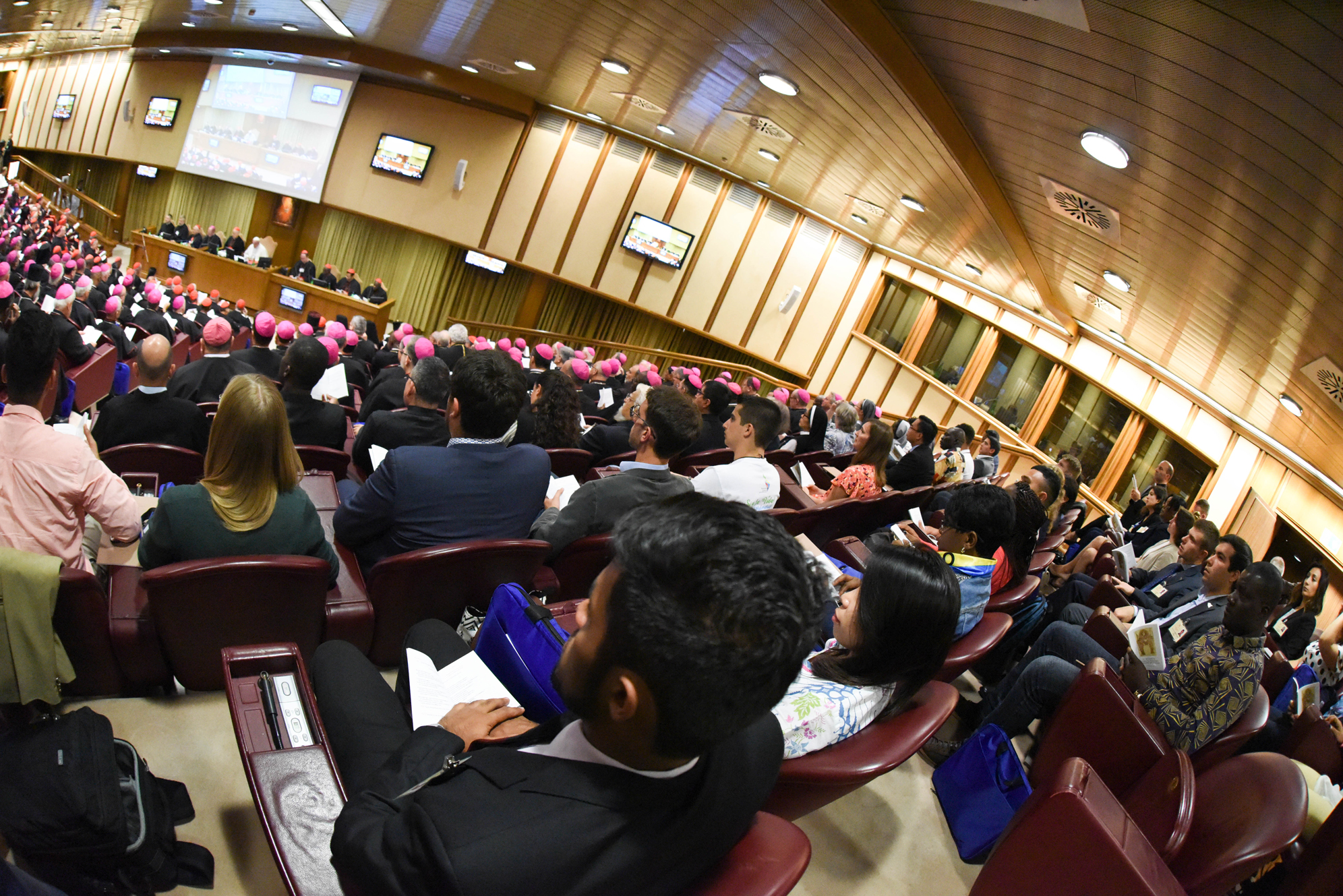Auditors
“Our Church is extremely conservative, owing to proximity to the Russian Orthodox Church and owing to the kind of priests and nuns serving in Russia”, said Ms. Oksana Pimenova, from Russia, youth auditor at the Synod. In fact “priests and men and women religious participate in decision-making and organizational processes while young people and the laity don’t. They invite us to consume what they believe can appeal to the young who participate, motivated by a yearning to be involved in every possible way”, as has occurred at the youth national meeting held past July on the banks of the Baikal lake

“It’s extremely interesting. I deeply appreciate it, although it requires a lot of effort since we take part in plenary assemblies to discuss the Working Document and in workshops. They are both very interesting and as auditors we take part in the debates and our opinions are very important for the bishops. But there are also many other meetings in between”, Ms. Oksana Pimenova, Russian youth auditor at the Synod, commented her experience for SIR with utmost enthusiasm. She he is listed as “Secretary of the Executive Committee of Youth Encounters of Mother of God at Moscow”, but Ms. Oskana carries out this assignment on a voluntary basis, alongside with two part-time jobs that she does for a living.
 The atmosphere has changed”, she said while the Synod is reaching its conclusive stage: “At the beginning people had their expectations and they brought with them their home environment.” This gradually gave way to an atmosphere of dialogue and mutual listening. She said she was impressed by “the honesty of some people who recognized the initial mistake of not having a clear picture of reality as it is. They apologized for this and they thanked young people for participating; I have appreciated interventions tackling practical situations, providing concrete indications and suggestions to ensure the involvement of the young, their active participation and co-sharing of responsibilities. Others only expressed the situation and problems of their home Country; some made a list of what “should and must” be done, which I don’t like, because it leads nowhere, it’s just empty talk with no concrete proposal.” Is something lacking?
The atmosphere has changed”, she said while the Synod is reaching its conclusive stage: “At the beginning people had their expectations and they brought with them their home environment.” This gradually gave way to an atmosphere of dialogue and mutual listening. She said she was impressed by “the honesty of some people who recognized the initial mistake of not having a clear picture of reality as it is. They apologized for this and they thanked young people for participating; I have appreciated interventions tackling practical situations, providing concrete indications and suggestions to ensure the involvement of the young, their active participation and co-sharing of responsibilities. Others only expressed the situation and problems of their home Country; some made a list of what “should and must” be done, which I don’t like, because it leads nowhere, it’s just empty talk with no concrete proposal.” Is something lacking?
“The voices of families, of parents, are missing. In the group discussions it was repeatedly pointed out that while we speak of young people the families are left on the sidelines. But families have an important role in the debates on young people. I have also noticed the absence of young consecrated religious, priests and nuns who experience specific problems that were not object of our debates here.” “I have appreciated the fact that we were given the opportunity to express ourselves and share our opinions. This is what I will bring back home with me: this atmosphere, this approach and the active involvement of young people, free to ask questions, to express our views, even if in some cases criticism was voiced, which can be unpleasant for listeners.” Her analysis is straightforward: “As young Russians we don’t express ourselves enough and we see that very little is changing.” The view of the Catholic Church in Russia is clear: “Ours is an extremely conservative Church owing to proximity to the Russian Orthodox Church and to the kind of nuns and priests serving in Russia.” In fact, “while priests and nuns participate in decision-making and organizational processes, lay people and youths are left out. We are invited to consume what they believe can be of interest for the young who participate motivated by the yearning to get involved in every possible way”, as occurred during the youth national meeting on the banks of the Baikal lake past July. These are important opportunities to meet, however “they are not sufficiently creative and do not actually help to deepen the faith of young people in Christ because young people are not offered what they want, but what others want to give.”
 The situation in Russia is extremely complex: in places with consistent numbers of young people “there is little room for them in parishes” while on the other hand “in small, isolated communities young people are few and they are isolated.” But for those who “really want to do something” there are platforms to get involved in various sectors, such as catechesis. Oksana underlined two further problems:
The situation in Russia is extremely complex: in places with consistent numbers of young people “there is little room for them in parishes” while on the other hand “in small, isolated communities young people are few and they are isolated.” But for those who “really want to do something” there are platforms to get involved in various sectors, such as catechesis. Oksana underlined two further problems:
the lack of “priests who are fully available to accompany young people with spiritual direction” coupled by a “‘conservative vision of vocational direction” viewed only as a function of three options (priesthood, consecrated life or marriage).” Another trait of Russian reality are “the broken, hurting families: divorced, single parents, thus young people are also seeking a family and an embrace inside the Church. ‘Communication’ is another critical aspect, whereby the laity are often perceived as a threat or as those who are trying to do what they should not.”
Oksana is confident: “I think that in our diocese something will change thanks to the atmosphere of the Synod, on the basis of what the bishops said there is an openness to involve young people in various activities, including decision-making processes.” Indeed, the involvement of volunteer workers is important because “we don’t need salaried work for the laity serving inside the Church, although things are changing.”
Oksana spoke in the Synod Hall and described “the situation of young people in Russia, the surrounding environment” and made some remarks on the third part of the Instrumentum laboris, which refers to concrete practices and tools to be adopted, making some suggestions and highlighting a set of expectations. “While the Synod per se signals a positive change, how things will move on in our respective environments and home Countries is more important. We have different problems and expectations, but I hope that this spirit of dialogue and understanding of young people will continue, involving also the families and lay faithful.”